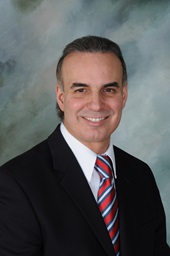Lenny Mirra sounds a warning about a political maneuver that may make Braver Angels’ job much harder. The maneuver: gerrymandering of political districts by politicians to improve their chances of election.
Lenny should know. A politician himself – he is the Republican representative for Massachusetts’ Second Essex district – he fears that gerrymandering, a legal but dubious trick devised in Massachusetts in the early 1800s and widely used worldwide since, will lead to enclaves of people who are more deeply Red or deeply Blue. And here is Lenny’s fear: “That means much more extremist people getting elected because they have to appeal to their base.”
His concern is well-founded. Although scholarly research doesn’t find that gerrymandering is the primary cause of polarization, it does uncover an uncomfortable trendline. “In recent years, red states have gotten redder, blue states bluer and the same holds for counties. Thus even in the unlikely event of across-the-board redistricting reform, the increase in competitive congressional districts may not be very big,” noted the author of a Brookings Institution paper as far back as 2014.
Such concerns set wings to Lenny’s feet in his other role as the Red co-chair of Braver Angels’ year-old Greater Boston Alliance. Together with Bob Scheier (Blue), Lenny works to bring together the dozen or so members of the new alliance each month. The two co-chairs also host a Braver Angels book club, and recently reviewed Jonathan Haidt’s “The Coddling of the American Mind.” The two co-chairs hope that in-person meetings can become a thing again. [Good things happen] once you sit down with someone from the opposing side,” notes Lenny. “I saw that a few years ago when women from Moms Demand Action for Gun Sense in America met with gun owners.”
Like alliances all over the country, though, the Greater Boston Alliance is starving for more Red members. “We have a mailing list of several dozen people,” says Lenny. But his and Bob’s ideal new recruits are not just any old Red-leaning individuals. “Success would be attracting specifically those who are most unhappy with what they’re seeing in the country –– like those who are out protesting,” he says. “A lot of them just want to be heard,” he continues. “This would give them that safe space to get their message out.”
Roping in Reds is no easy job, even for a Red politician in a deep-Blue state. Lenny – one of the few Republicans in the Commonwealth’s state legislature – works hard to persuade many of those he meets to consider ways of connecting with those more liberal. But he continually runs into suspicions borne of the hostility that many Massachusetts Reds feel. “It’s been very difficult – you’re asking individuals to join one by one…They suspect they could be judged, targeted, labeled [in forums where they meet with liberals],” he says. One particular flashpoint is the idea of addressing racial issues in school curricula: “A lot of [Reds] feel like they’re being called racist. Nobody wants to be called that.”
One of the initiatives that he and Bob have been pushing on is to take the Braver Angels message into schools and colleges in Massachusetts. They recently presented together at Concord Academy, an independent preparatory school for grades 9 through 12. Lenny is particularly eager to tone down the assertively anti-conservative culture that pervades many campuses today. There’s a crisis of freedom of speech on our college campuses,” he declares, citing what some have labeled “a modern-day book burning.”
Lenny is also keen to let it be known that not every political body is hyper-polarized. Fresh off of a Braver Politics meeting, he declares that elected officials on both sides of the aisle on Beacon Hill – Massachusetts’ seat of government – get along famously well. “The problem is not among state legislators; the problem is with our base,” he says.
And what about the gerrymandering issue? That will be especially difficult to resolve. “We have to find ways to take redistricting out of the hands of elected officials,” says Lenny. “Here in Massachusetts, we have 10 years before we do this again.”
That may seem like a lifetime away. But it’s the blink of an eye in terms of political polarization.

‘Mind The Gap: Atlanta’ performance uses theater to ‘depolarize’ politics
By Jim Bass, Published in Decaturish



